History
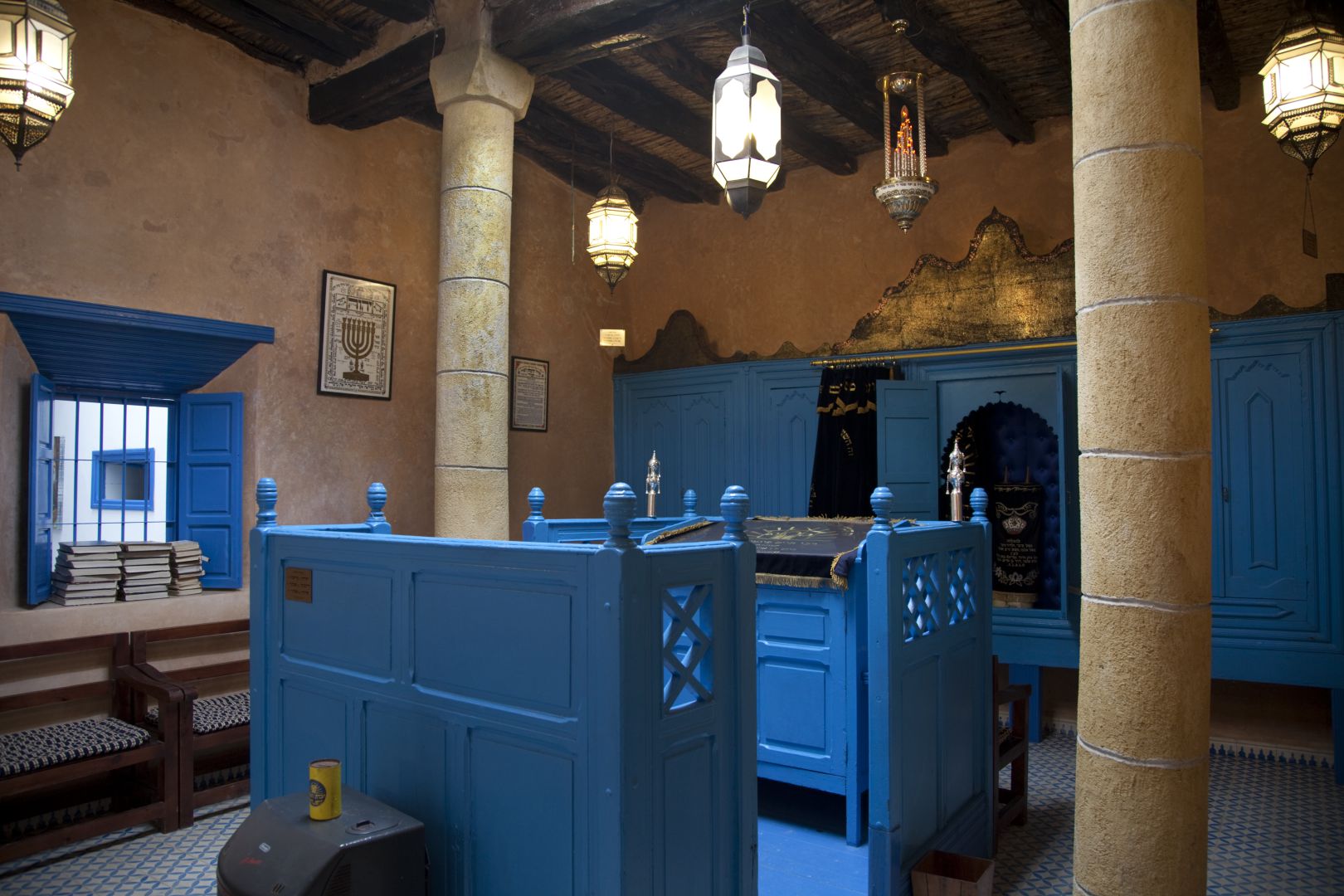
The American Sephardi Federation (ASF) was founded from and by several 20th Century Sephardic organizations, including the World Sephardi Federation (WSF) in North America.
The need had arisen for a U.S.-based organization that could fulfill the WSF’s purpose, especially to unite and represent the various Greater Sephardi communities, i.e., the traditional Sephardim (Jews who traced their lineage to Spain and Portugal), as well as Jews stemming from the Mediterranean basin, the Balkans, Middle East, Africa, and Asia.
The World Sephardi Federation arose in 1925 at the international convention of Sephardi Jews held at Vienna, prior to the 14th Zionist Congress. Before this, the heads of the Sephardi communities in Palestine, the Balkans, and Central Europe had established a World Union of Sephardi Jews that sought to address the educational and social needs of the Sephardim both in the land of Israel and the Diaspora. With the re-birth of Israel as a modern state in 1948 and subsequent waves of Jewish immigrants, the WSF began to fight for recognition and restitution for the so-called “Forgotten Refugees” from Muslim-majority countries, and to redress perceived injustices that they faced with their integration into what was for them a foreign, predominately Ashkenazi society and an Israeli government that was still stymied by a socialist-style command-economy, with its incumbent shortages and strive towards homogeneity. In later decades, WSF’s mission came to include assisting the Jewish communal remnants outside of Israel in the Middle East and North Africa.
A conversation at the Second Annual Convention of the American Zionist Federation (Palmer House, Chicago, 21-23 October 1972) served as the catalyst for ASF’s formal founding. On 25 February 1973, 250 delegates attended the launch of ASF at New York City’s Shearith Israel: The Spanish and Portuguese Synagogue, the oldest Jewish congregation in the United States. Dr. Daniel J. Elazar, a renowned Professor of Political Science at Temple University and proponent of Classic Sephardic Judaism, served as ASF’s first President from 1973-1975.
ASF’s initial agenda was focused on connecting Sephardic communities, promoting traditional Sephardi social and culture activities, supporting the fledgling Jewish State, and particularly providing material support for Sephardim in Israel.
During the term of ASF’s second President, Moroccan-born Liliane Winn Shalom, ASF started to systematically develop relationships with Sephardi communities throughout the United States and around the world. When the World Jewish Congress convened in 1978, ASF was recognized as the representative of Sephardic communities in the United States.
Congregation Shearith Israel’s Rabbi Marc Angel launched another Sephardi organization, Sephardic House, in 1978, for the purpose of creating cultural events that promote awareness and interest in the rich mosaic culture of Sephardim.
1982
In 1982, Leon Levy, a businessman, philanthropist, and the Seattle-born son of Turkish immigrants, became acting President. He went on to serve as ASF’s third President from 1985-2003, a period in which his personal determination and commitment secured the ASF’s position in the U.S. Jewish community.
To mark the Quincentennary of the Alhambra Decree, which expelled the Jewish communities from Spain and Spanish territories, a series of international events were organized between the years 1988 and 1992. ASF played a leading role in several initiatives, including the Spanish Government’s “Sepharad ’92,” the International Jewish Committee for Sepharad 1992 (formed by Israel’s first Sephardi President, Yitzhak Navon, and directed by Hal M. Lewis, ASF’s National Executive Vice President at the time), and “Sephardi Odyssey,” a trip that took participants to Morocco, Spain, Greece, Turkey, and Israel.
Mr. Levy sought to bring Sephardim together with a series of national conventions held in different locations around the country each year between 1987 and 1995 (with the exceptions of 1992 and 1994). Conventions were thereafter held in 1998 and 2002. From 1997 to 1999, Mr. Levy served as Chairman of the Conference of Presidents of Major American Jewish Organizations, the first Sephardi to hold this prestigious position, signaling the recognition of ASF as the representative of the Sephardi voice in Jewish communal and diplomatic affairs. In the 1990s, Sephardi House launched the New York Sephardic Film Festival.
The most significant achievement of Mr. Levy’s term was to sponsor ASF’s joining with four other leading Jewish scholarly organizations (YIVO: Institute for Jewish Research, Leo Baeck Institute, American Jewish Historical Society, and Yeshiva University Museum) to form The Center for Jewish History at 15 West 16th Street. Founded by Bruce Slovin (then Chairman of YIVO’s Board of Directors) and opened in 2000, The Center for Jewish History was envisioned to be a “preeminent research, historical and educational institution devoted to exploring the richness of Jewish life and letters, and showcasing the enormous contributions Jews have made to modern civilization.” Affiliate organizations (Centro Primo Levi, the Sephardi Education Center’s New York Office, Yemenite Jewish Federation, Gomez Foundation for Mill House, and Sephardic House) joined ASF in establishing a permanent address for Sephardim in America at The Center for Jewish History. In June of 2002, Sephardic House formally merged with ASF, providing a living legacy of cultural programming, a burgeoning library and archive, and publishing imprint. Also in the mid-2000s, the Broome & Allen Boys Association began administering its scholarship fund through ASF.
After Mr. Levy took on emeritus status in 2003, Mr. David E.R. Dangoor, a Swedish businessman, diplomat, and philanthropist hailing from an illustrious Baghdadi-Jewish family, became ASF’s fourth President. This change of the guard resulted in efforts to build an organization with a more schoalrly focus, including initiatives to explore and bring about greater recognition of the various Greater Sephardic communities, whose history, traditions, and rich mosaic culture are an integral part of the Jewish experience.
Mr. Dangoor’s reinvigorated ASF launched The Sephardi Report, supported the publishing of scholarly books and articles, presented annual educational and cultural programming, partnered with scholarly institutions to further research (including the USC Shoah Foundation’s interviews of Sephardi Holocaust survivors, and Smithsonian Institute), built the National Sephardic Library (one of the largest publically accessible library (more than 13,000 volumes) and archival collections in the Western Hemisphere), and dramatically increased the reputation and attendance of the film festival by renaming it the “NY Sephardic Jewish Film Festival” and creating the Pomegranate Award to recognize Sephardi Excellence in the Arts. ASF combined exhibitions, galas, and/or scholarly symposia on specific themes: “Back to Babylon: 2,600 Years of Jewish Life in Iraq” (2006), “From the Days of Alexander: Celebrating Greek Jewry” (2007), “Remembering Old Bukhara” (2007), “Jerusalem and the Jews of Spain: Longing and Reality” (2009), “2,000 Years of Jewish Life in Morocco,” a year-long series of events that received the High Patronage of Morocco’s King, Mohammad VI).
2014
In 2014, Mr. Dangoor recruited Jason Guberman-P., a social entrepreneur who specializes in building broad coalitions and melding intellectual and technical innovation, to serve as ASF’s Executive Director. The years since have seen a substantive increase in ASF’s activities, ranging from hosting enlightening educational, diplomatic, and cultural public programs to launching e-publications (The Sephardi World Weekly and Sephardi Ideas Monthly), and creating new spaces (Oded Halahmy Gallery, Myron Habib, A”H, Memorial Display Case, and ASF’s new Sephardi Scholars Center) for research, events, and exhibitions.
2015
In 2015, Lauren Gibli launched ASF’s Young Leadership Board and was recognized as one of the Jewish Week’s 36 under 36 for “Cultivating Sephardi Pride,” ASF fully integrated the former Broome & Allen Boys Association by creating a permanent endowment to support Sephardi scholarships and fellowships, honored Erez Bitton with a Pomegranate Award for Lifetime Achievement in Literature (he went on to be the first Sephardi to receive the Israel Prize) at the 18th NY Sephardic Jewish Film Festival, dedicated the Enrico Macias Music Library at ASF in honor of the legendary Constantine, Algeria-born French superstar and NYSJFF Pomegranate Award Lifetime Achievement honoree, and created Sephardic Journeys with The Center for Jewish History, an exhibition in The David Berg Rare Book Room highlighting rare works from ASF’s collection. Sephardic Journeys is now published as part of the Google Cultural Institute.
some highlights from 2016:
— ASF awarded the 2016 Pomegranate Award to Ema Shah, a multi-talented Kuwaiti performer whose anthropological approach to music and civil society activism have made her one of the Arab world’s most courageous celebrities. Her performance at Opening Night of the 19th NY Sephardic Jewish Film Festival was covered in the international press, including Kuwait’s al-Rai newspaper.
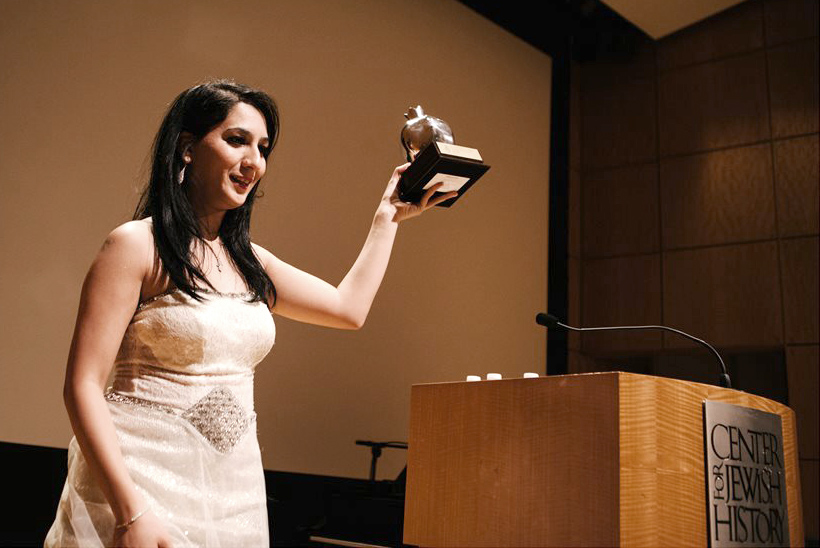
Kuwaiti star Ema Shah receiving the Pomegranate Award
— ASF’s exhibition, Bollywood & The Bene Israel in Bollywood & Beyond was favorably reviewed by NBC News, Desi Talk (the NY Metro print edition of The New Times India), The Jewish Week, and The Jerusalem Report, which noted how “ASF’s events are not only meant to entertain, but also as outreach for individuals and communities that have not yet recorded their histories.”
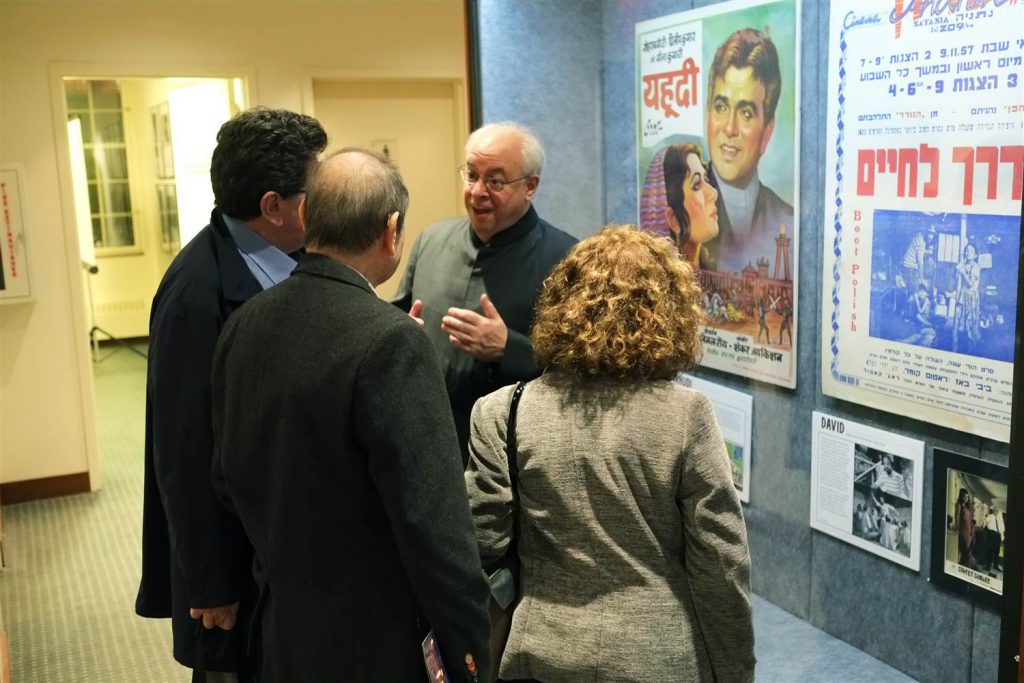
Photo: NBC News
— The American Sephardi Federation, Sousa Mendes Foundation, and Portuguese Consulate of New York partnered with Municipality of Almeida, Portugal, The Museu Virtual Aristides de Sousa Mendes, Turismo Centro de Portugal, The Center for Jewish History, YIVO: Institute for Jewish Research, The American Jewish Historical Society, Leo Baeck Institute, Luso-Americano Foundation, and The International Raoul Wallenberg Foundation to create an exhibition, Portugal, The Last Hope: Sousa Mendes’ Visas for Freedom.In honor of its opening, on 7 April, António Baptista Ribeiro, Governor of Almeida, Portugal, flew in and presented ASF and several other participants with medals. On 22 September, ASF hosted the President of Portugal Marcelo Rebelo de Sousa for a tour of the exhibition: “Your history is our history,” said the President before a private reception of Holocaust survivors saved by Aristides de Sousa Mendes and board members of the ASF, American Jewish Committee, B’nai B’rith International, Sousa Mendes Foundation, and Sephardic Home for The Aged Foundation, as he announced his intention to confer on Mendes Portugal’s Grand Cross of the Order of Liberty. Video of the visit garnered over 20,000 views on Facebook.
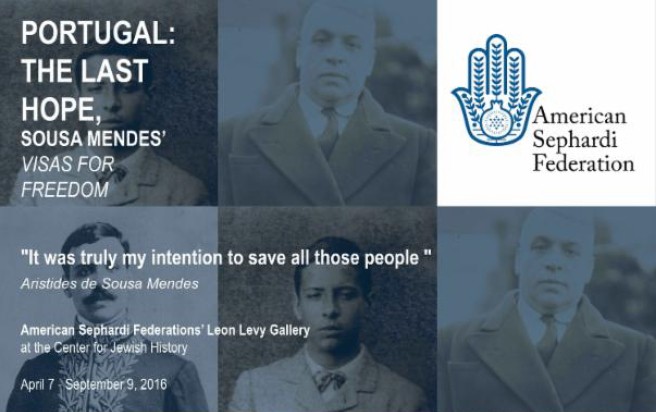
Portugal: The Last Hope. Sousa Mendes’ Visas for Freedom.
— From Casablanca to NYC: A Night of Moroccan Culture presented by AJC ACCESS NY (the young leadership division of the American Jewish Committee), the American Sephardi Federation, Association Mimouna, and the Moroccan community in New York. Sponsored by Morocco’s Tourism Office and Nahmias et Fils: More than 400 guests celebrated the love and friendship between Morocco and the Jewish world at this one-night festival of music, dancing, and food, which followed a forum featuring scholars and diplomats. Mehdi Bensaid, Chairman of the Moroccan Parliament’s Foreign Affairs and Defense Committee, flew in from Morocco exclusively to participate in a “From Casablanca to NY’s” panel discussion with Abderrazzak Laassel, Deputy Permanent Representative of The Kingdom of Morocco to the UN. Jason Isaacson, AJC Associate Executive Director for Policy, moderated. Carlos Benaim, a member of ASF’s Board of Directors, native of Tangier, Morocco, and internationally renowned perfumer (Yves Saint Laurent’s L’Homme Libre, Elisabeth Taylor’s White Diamonds, Ralph Lauren’s Supreme Oud) introduced the event. Jason Guberman-Pfeffer, ASF’s Executive Director, gave the audience a tour of Jewish sites in Morocco, including the Baba Sali’s Home in Risani and Haim Pinto Synagogue in Essouira, and encouraged them to help the Diarna Geo-Museum of North African and Middle Eastern Jewish Life digitally document and preserve synagogues, schools, shrines, and other structures throughout the region. Mohammed Benabdeljalil, The Kingdom of Morocco’s Consul General in New York, praised AJC for its diplomatic initiatives, and particularly for strengthening the American Jewish community’s friendship with Morocco, a critical relationship in a tumultuous region. Dr. John P. Entelis (Fordham University) spoke about Morocco’s leading role as a moderate Muslim state in the region, highlighting challenges and impressive achievements, as well as praising the leadership of King Mohammad VI and his forbearers, King Hasan II and Mohammad V.
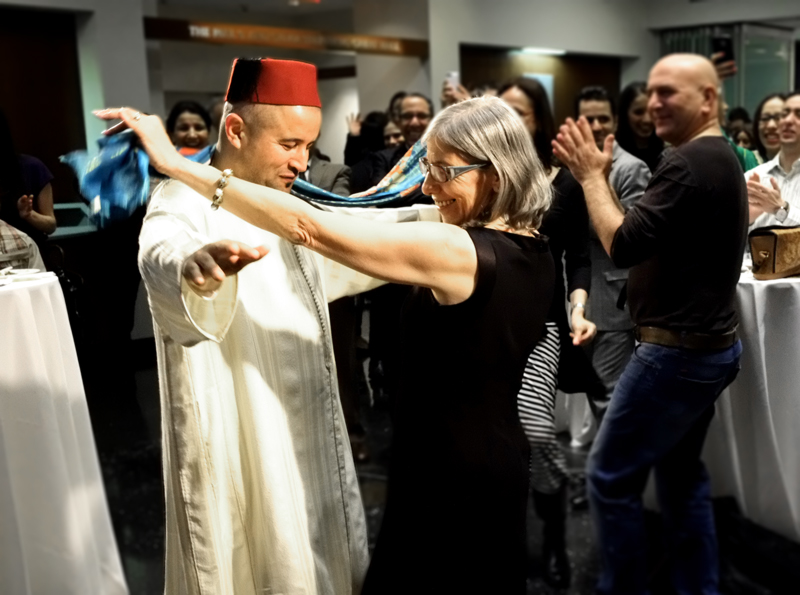
From Casablanca to NYC: A Night of Moroccan Culture